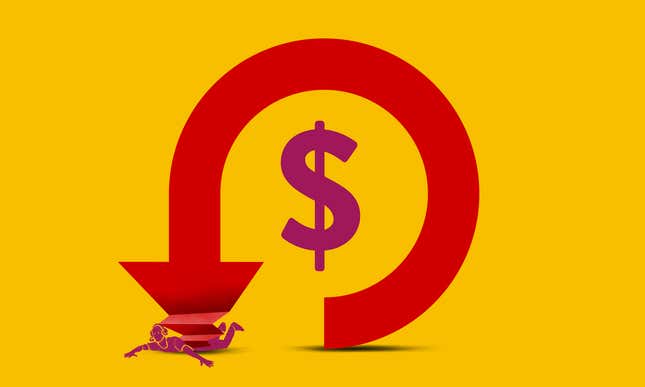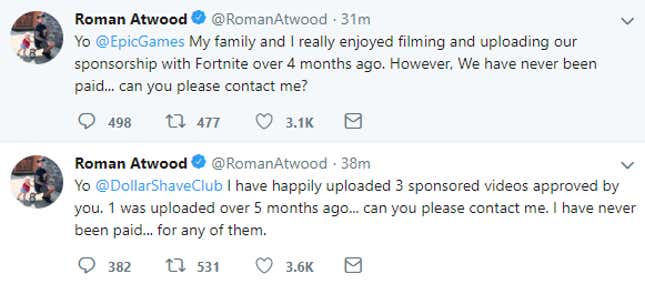
In the lawless, wild west industry that is streaming video games, and the surprising gold rush that has gamers tearing up their I-9s, an time-honored line of work is now arriving on the scene: debt collection.
Forty outstanding bills sat in Omeed Dariani’s accounting system when we spoke last week. “And a third of them are from large companies whose names everyone knows,” Dariani told me.
For four years, Dariani has been head boss of the Online Performers Group, a full-service management company for Twitch streamers. He has 50 streamers in his stable, including big names like CohhCarnage (1 million followers), KingGothalion (900,000 followers) and ProfessorBroman (700,000 followers). After six, eight or ten hours a day playing games for huge, tuned-in audiences, a lot of streamers are too burnt out to be their own accounting departments, he said over the phone.
Today, Dariani is launching a debt collection arm for his business, which seems to be the first of its kind—open, in theory, to whichever streamer writes him—that will help streamers collect overdue money they earned.
“It’s not uncommon for something to go 30, 60, 90 days overdue,” said Dariani. What he says contributes to that just as much, if not more, than companies dragging their feet on signing checks is streamers’ business illiteracy.
Streamers and YouTubers fill their wallets through gains from lucrative deals with brands. Flashy headsets, towering gamer chairs and that mysterious G-Fuel substance often feature in online personalities’ videos, sometimes as a result of a contract signed with a brand through an agency. There are also one-off deals with game or hardware publishers who want a charismatic streamer to showcase their upcoming product or appear at an event on their behalf. Contracts between brands and internet celebrities are the lifeblood of the industry. When they aren’t seen through—whether through companies failing to pay or streamers struggling to keep track of their income—that can be a thorn in streamers’ sides for weeks or months at a time, in an industry that already demands full-time engagement with demanding audiences.
Shannon Plante is a gaming personality who manages her fiancé Chris “Sacriel” Ball’s Twitch stream. (Dariani manages Ball.) Years ago, when she was just getting a handle on the business side of things and bigger companies were catching on to the rising tides of the streaming industry, Plante said, “There was no guidebook for anyone, on either side.” Plante would pore over spreadsheets and scrutinize complicated contracts—something she had no formal training in—to make sure they reaped what they earned. Once, she said, the pair was owed something around $5,000 for six months.
“I dont think it’s nefarious in nature, that they mean to get one over on you,” said Plante, citing opaque third-party involvements and improperly conveyed invoicing instructions. “Sometimes I think it’s just poor business. But that doesn’t really matter in the scheme of things when you agree to a contract and you sign on the dotted line.” While we talked, Plante counted four currently overdue items that she said should have been paid out over the last three months, but she declined to share who the contracts were with.
Escalating a payment issue could signal you’re the kind of person who talks smack about sponsors and isn’t reliable to work with (and in some cases, is a contractual violation)—a dynamic that isn’t in online personalities’ financial favor. That’s why it was such a huge shock when, earlier this week, huge YouTube personality Roman Atwood posted two tweets calling out two companies for, he alleged, not paying him on time. The tweets are now deleted, and when Kotaku attempted to confirm the details of the tweets with Atwood and his manager, the manager refused to comment on the record.

(In an e-mail, Epic Games declined to comment. Dollar Shave Club contends that they did in fact pay Atwood on time.) Although the truth value of Atwood’s claims are up for debate, what is telling was how his fans responded. Dozens of replies under his tweets ventured that the YouTuber was hacked, and that he’d never call out business affiliates in such a cavalier way. It was a contentious series of tweets, in part, because publicizing alleged debts is basically unheard of in the online entertainment industry. In fact, many streamers I reached out to for this story declined to comment on whether outstanding debts are a problem for them.
Since streamers and YouTubers rely so much on these deals, there isn’t a huge incentive to speak up for yourself when you feel slighted. Back when Fortnite streamer Siefe, who also now works with Dariani, was small-fry, he said, he was “at the will” of companies whose contracts he signed. “Everything was pretty new for both parties back then. They thought what YouTubers and streamers did was all just fun. It was our side gig while we rode our yachts and had our lawyer jobs.” Siefe added, “When you send an email like, ‘Hey, I want my money,’ it sounds kind of weird.”
Dariani’s company will take 15 percent of whatever debts they collect. His accounting department will gather together the streamers’ contracts and materials, determine whether they saw their part through, contact companies on their behalf, extract information on what it will take to get paid, and convey that to the streamer, who will ideally take their advice. If companies still don’t pay, he’ll suggest more serious courses of action, like going to small claims court. “Debt collection has a connotation of calling you up and sending threatening letter,” said Dariani. The reality, he says, is a little more mundane.
“Even just producing a W-9 and an invoice for the average streamer can be pretty difficult,” said Dariani. A lot of these micro-celebrities are fresh out of high school and completely new to the high-stakes art of filling out forms. Worse, a few simply refuse. Dariani recalled a horror story in which he asked a streamer client for a contract he made with a business. The streamer said it was in his email. Dariani suggested that the streamer search for it. “Instead of that, he sent me his login and password and said, ‘Can you do this?’ I was very uncomfortable, but it was the only way we’d get it,” said Dariani.
He added, “Most streamers start when they’re young and don’t get those office training skills because they became performers. It’s the same logic where we’d never expect Tom Cruise to negotiate his contract.”
As the scale of the streaming industry balloons into a big money, big celebrity affair that all sorts of companies want a piece of, the duty of making sure the money machine is well-oiled falls either on overworked streamers or on middlemen like Dariani. This online industry that began just a few years ago as an unregulated hobby is now becoming, in many ways, corporate. Kids who game on camera are now entrepreneurs. The people who keep them on track aren’t just chat moderators; they’re managers. As streaming scales, it’s falling into a well-established pattern set by the entertainment industry, in which corporations are king. And now, there’s a guy collecting streamers’ outstanding debts.